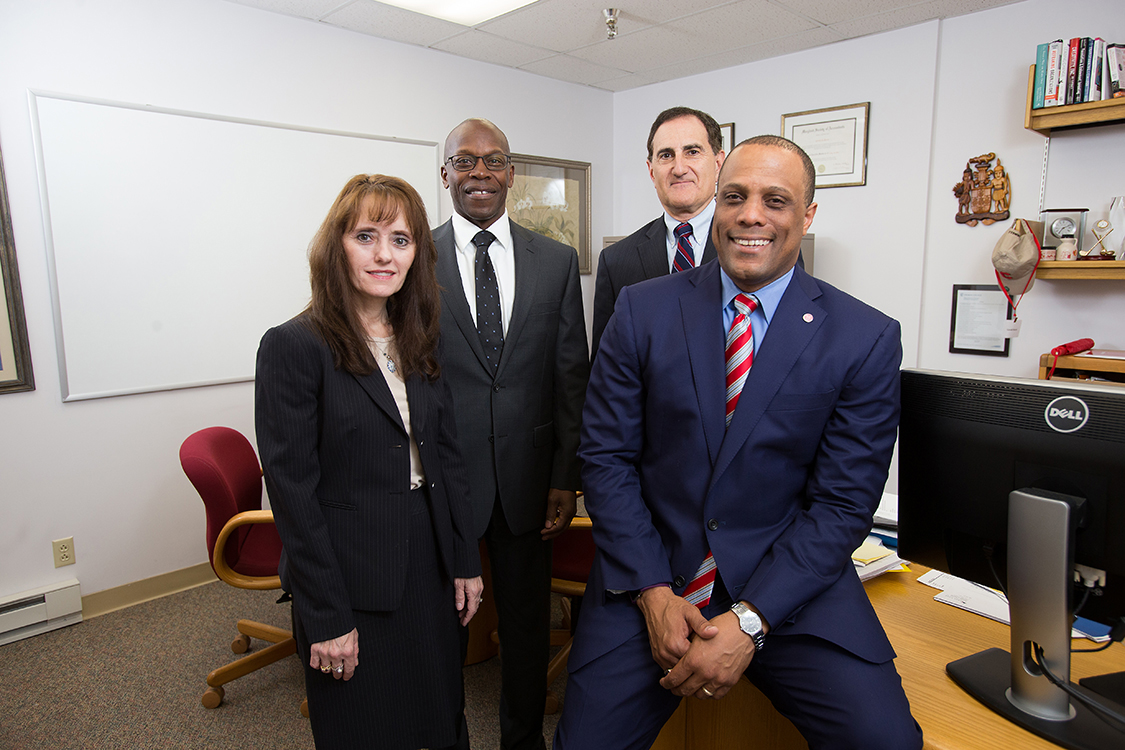With full team, Financial Affairs focuses on the future
By Nancy Doolittle

Over the past two months, Gerald Hector, vice president for financial affairs, has filled three key positions in the Division of Financial Affairs (DFA). With his leadership team complete, he is setting his sights on the strategic work he began shortly after arriving at Cornell last summer.
William Sibert ’85 became the university’s new controller May 1. He recently served as vice president for finance and controller for MPI Research in Michigan. Previously he was chief operating and financial officer of a startup technology firm, Priva Technologies, in California. A former U.S. Marine Corps captain with a Master of Science degree in accountancy, Sibert brings to the position valuable experiences in industry and “his advocacy for building a culture of excellence wherever he leads,” said Hector. Sibert succeeds Kim Yeoh, who served as interim controller since April 2016.
Reporting to Sibert will be John Harabedian, the university’s new tax director, and Carol Rickel, the new director of the University Finance Service Center.
Harabedian comes to Cornell from a similar position at Rutgers University. “John brings more than 20 years in higher education tax experience and advocacy, as well as conducting extensive research on tax issues concerning higher education,” Hector said.
Rickel is a financial professional with extensive experience in process improvement, business analysis, financial reporting and management of transactional accounting. Hector said, “Carol’s experience will be key in our collaborative campuswide effort to look at all aspects of our day-to-day operations around payment processing.”
Sibert will serve on Hector’s leadership team, which includes Joshua Adams (communications and university policy), Craig McAllister (risk management and insurance), Thomas Romantic (procurement and payment services), Jeffrey Silber (sponsored financial services), Harper Watters (treasury and debt) and Robin Yager (budget and financial initiatives).
Hector noted that soon after he came to Cornell, he began meeting with the deans, vice presidents and other campus constituents to get a sense of their concerns and to begin to think about how the Division of Financial Affairs could better collaborate and be a more strategic partner with them.
“Much of the work of DFA is transactional – processing payments, reinforcing laws and regulations, and accurately recording, summarizing and reporting on the university’s finances,” he said. “But that work needs to occur within the context both of the rules and regulations that govern its policies and procedures, and the processes and needs of our colleagues across campus. We need to understand their operations so we can decrease their administrative burden and better support their endeavors around scholarship, research and student enrichment.”
Hector said that conversations between DFA staff and campus constituents are critical to the division’s being able to assist units and schools in meeting their goals – and also to avoid unintentional consequences that might otherwise arise when changes in DFA policies, procedures or technologies occur.
Hector is also focused on the organizational culture within DFA and wants to better empower DFA staff through professional development opportunities and better communication within the division.
He has articulated four core principles to guide the division: ownership, accountability, transparency and empowerment.
“Individuals have to own the tasks for which they are responsible and be accountable for the outcomes,” he said. DFA staff also should feel that they understand the priorities and directions of the division and have a voice in its decision-making. “Information is power in any organization, and sharing that information allows for multiple perspectives, improving the decision-making process,” he added.
Hector believes that from transparency comes empowerment, when staff believe they are valued and are contributing to the overall success of an organization. To further that empowerment, four internal groups have been formed: divisional council, budget steering committee, trust committee and excellence committee. These internal teams provide avenues for DFA staff to voice their concerns, leadership to address them, and all members of DFA to engage in conversations about the work of the division across campus and within the broader Cornell mission.
Media Contact
Get Cornell news delivered right to your inbox.
Subscribe